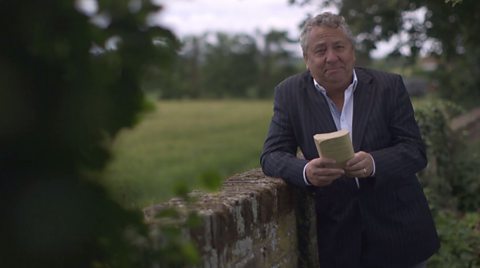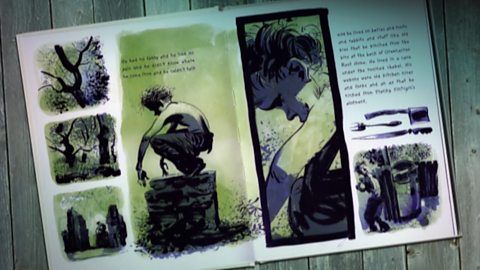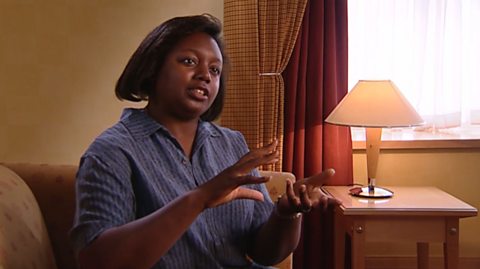Anthony Horowitz:Hello, I'm Anthony Horowitz. As a storyteller one of the greatest, most enjoyable challenges, is creating an unforgettable character whom readers want to follow again and again.
Anthony Horowitz:Some of these characters become so familiar to us, they seem to have existed forever, like James Bond, Robin Hood, Superman or the world's most famous detective Sherlock Holmes.
Anthony Horowitz:Holmes has been everywhere, in films, on TV and of course in books. I've actually written two Holmes adventures myself, but obviously I didn't invent him.
Anthony Horowitz:Holmes and his loyal companion, Dr John Watson, first appeared way back in 1887, born from the imagination of Sir Arthur Conan Doyle.
Anthony Horowitz:But a real person did provide the inspiration for Doyle's famous creation. And to discover who that was, and how that worked, let's join Andrew Marr, carrying out his own elementary investigation.
Andrew Marr:'The first great sleuth in detective fiction is Sherlock Holmes. 'That much at least is elementary. 'Other fictional detectives had come before.
Andrew Marr:'But it was Holmes with his prodigious intellect, 'his quirks and eccentricities that captured the public imagination, 'and spawned an army of imitators.
Andrew Marr:'So what makes Sherlock Holmes so irresistible?
Andrew Marr:'I think we read a Sherlock Holmes story 'because we want to stand with his friend Watson 'and watch the great man as he solves the mystery.
Andrew Marr:'And when we do this we are actually recreating 'Dr Arthur Conan Doyle's own experience as a student. 'When he observed Joseph Bell, his mentor at Edinburgh University, 'display his powers of reasoning.'
Andrew Marr:Bell would amaze his students by looking at a patient and simply using his acute powers of observation and deduction, revealing the underlying story of who they were.
Andrew Marr:So he'd turn to the patient and say, "Well my man, you've been serving in the army.""Aye."Because the man was respectful, but hadn't removed his hat. An army trait.
Andrew Marr:"But not long discharged?"Aye."Because if he had been long discharged, he'd have picked up civilian ways.
Andrew Marr:"And you served in a Highland regiment." He's picked that up from the accent of course. "Aye.""And you served, I think, in Barbados?""Aye."Because the man has elephantiasis, a disease prevalent in the West Indies.
Andrew Marr:By picking up on these tiny details Bell wasn't simply showing off, though he was certainly doing that. He was creating the method that would be used by Holmes himself. Small, apparently insignificant details which when woven together, told the true story of a human life.
Andrew Marr:'Thanks to Bell's methods, 'Holmes had the super human ability to extract information from anyone. 'And there was something omniscient about him.
Andrew Marr:'In the modern Victorian city, the detective could go everywhere, 'speak to everybody. 'From the top of society down to street level. 'As Holmes says himself, being a professional voyeur is a lot of fun.'
Reader:"My dear fellow", said Sherlock Holmes. "If we could fly out of that window, hand in hand. Hover over this great city. Gently remove the roofs, and peep in at the queer things which are going on, it would make all fiction, with its conventionalities in forcing conclusions, most stale and unprofitable."
Andrew Marr:'But here's the odd thing about Holmes, 'although he takes us into other people's lives 'the privileged access doesn't extend to the drug taking brainiac himself.
Andrew Marr:'In detective fiction, the sleuth can know everything about everybody else 'but we're never allowed to know too much about him.'
Andrew Marr:Conan Doyle has Watson tease us with the titles of other Sherlock Holmes adventures the good doctor will never get round to writing up. So there's the Paradol Chamber, the Camberwell Poisoning Mystery, The Amateur Mendicant Society, and best of all The Giant Rat of Sumatra. A story for which the world is not yet prepared.
Andrew Marr:'Conan Doyle withholds in other ways 'what we know is filtered through Dr Watson, 'the quintessential sidekick in detective fiction.'
Anthony Horowitz:Now you'll have to excuse me for getting involved with this point, but Andrew was interested to know about my experiences when I was asked to write some new adventures for Holmes and Watson.
Anthony Horowitz:And one of my discoveries was how Watson, and figures like him who aren't the main character, play a really vital role when a writer is creating detective stories.
Anthony Horowitz:The sidekick is invaluable in detective fiction because without him we don't know what the detective is thinking. That's the first thing and again, you know, in these stories, we only get inside Holmes' mind when Holmes tells Watson what he's doing. The voice of Watson is part of the genius of the whole construction.
Anthony Horowitz:You get this very affable, warming, humane voice commenting on this character who is anything but. And it's the contrast between the two that works so perfectly well.
Anthony Horowitz:When I came to write The House of Silk, the first thing I had to do was to acquire the voice of Dr Watson.
Andrew Marr:So the detective is the kind of genius as you were, he's the great artist, and between us and the artist, we need an interpreter we need the critic, we need somebody who gets us from ourselves to the genius. We can't do it in one jump ourselves.
Anthony Horowitz:Yes. But the clever writer also uses the sidekick to do the exact opposite of that.
Anthony Horowitz:I mean I write detective fiction, and use my sidekick always to distract. So for example, in this room we're sitting in now, the sidekick might ask you about why the logs are arranged in a certain way in a fireplace, but as the author I'm only doing that because I don't want you to be looking at the picture over there which is the real clue.
Anthony Horowitz:The sidekick always is the sleight of hand, he always takes you in the wrong direction.
Video summary
Andrew Marr investigates how Arthur Conan Doyle first created the unforgettable character of Sherlock Holmes, back in 1887.
He uncovers the real life inspiration for the first great sleuth and ÔÇśbrainiacÔÇÖ in detective fiction and finds out where HolmesÔÇÖ distinctive quirks and eccentricities may have come from.
With Anthony Horowitz, Marr explores other important aspects of Conan DoyleÔÇÖs narrative, such as how HolmesÔÇÖ reputation is elevated within the stories, ways that information is withheld from the reader, and the role of the sidekick in crime writing more generally.
Teacher Notes
Could be used to inspire students towards the creation of their own unforgettable characters through real-life experiences and observation of people they know.
Students might also invent additional titles of Sherlock Holmes cases, or do the same for their own invented character.
This clip will be relevant for teaching English Literature at KS3 and KS4 in England, Wales and Northern Ireland and National 4 and 5 in Scotland.
Comedy and tragedy in Great Expectations. video
Tony Jordan investigates Charles DickensÔÇÖ life during the writing of Great Expectations.

Music in performance poetry. video
Anthony Horowitz introduces the work of Kae Tempest to consider the musical quality of poetry.

What is the power of poetry? video
Griff Rhys Jones on why poetry is powerful and how it differs from other forms of writing.

What inspires a writer? video
Anthony Horowitz discusses writing the Sherlock Holmes novels and shares his top tips for writing.

Comic strips and graphic novels. video
David Almond and Eoin Colfer explore flexibility of form in contemporary narrative writing.

╠ř
What makes good story writing? video
Jamila Gavin, Keith Gray, Jacqueline Wilson, David Almond and Malorie Blackman share their writing secrets, giving consideration to where they find their inspiration, what their writing triggers are, and how they get writing started.

╠ř
╠ř